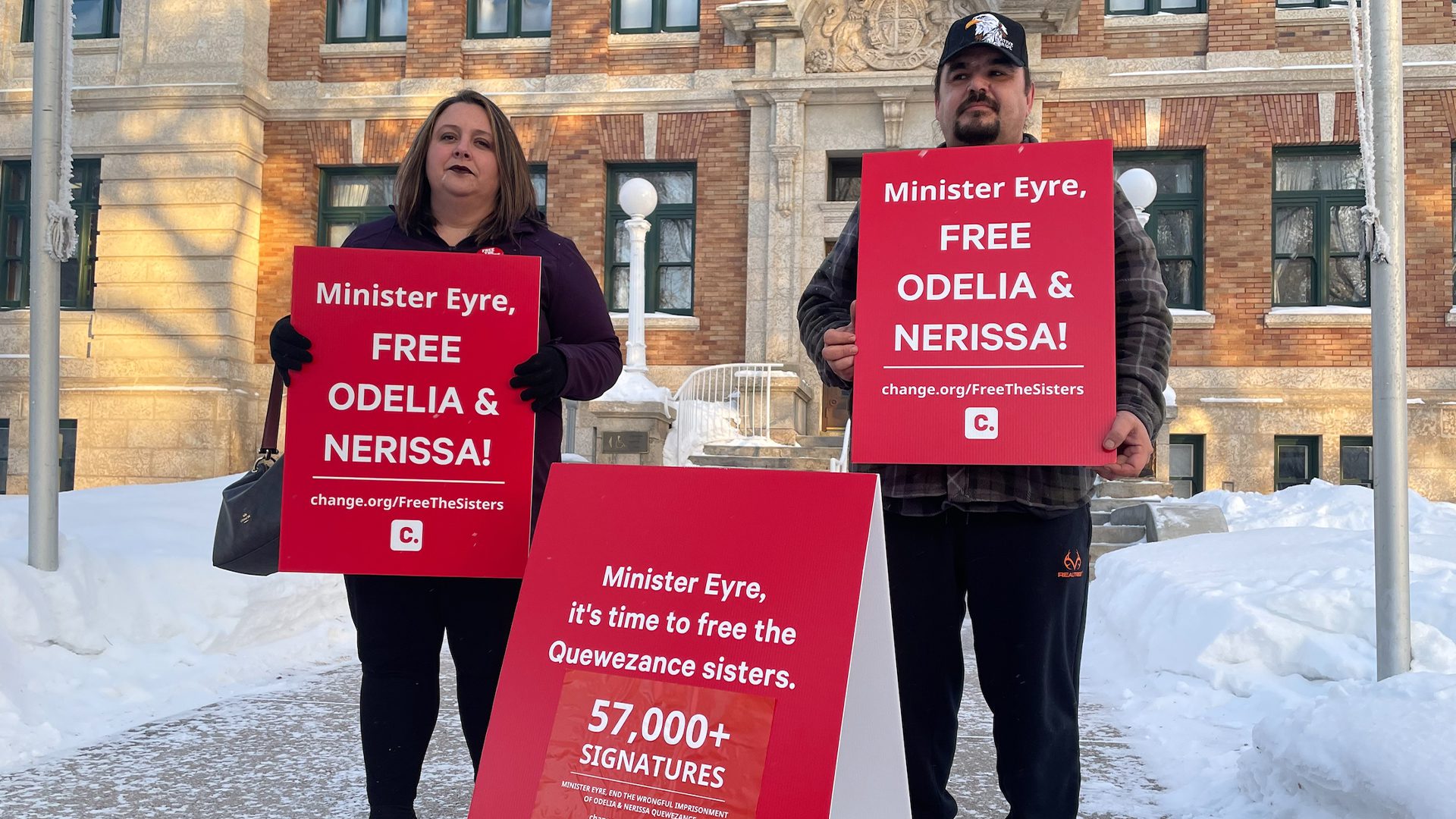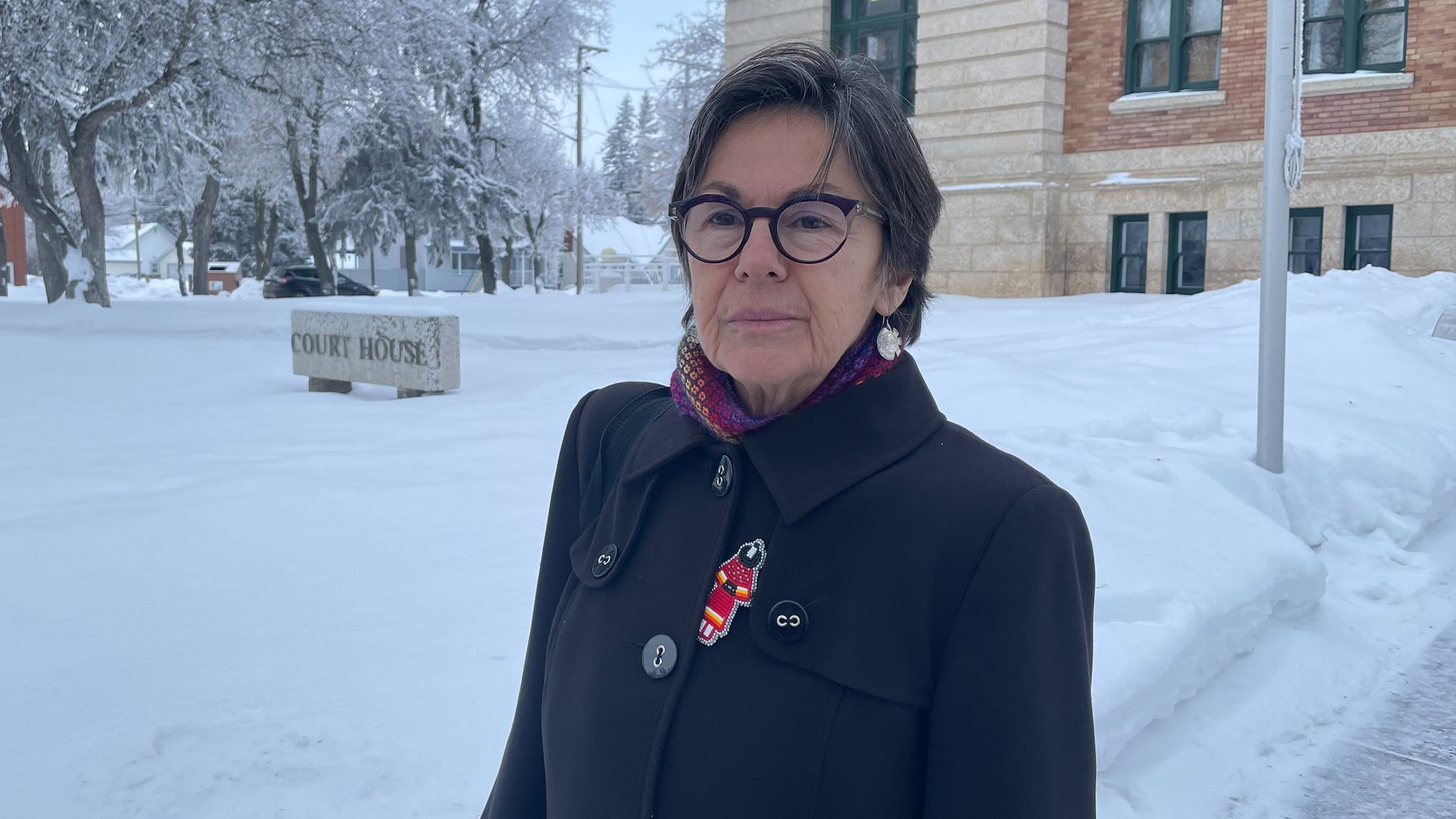Decision reserved
It could be several more weeks before Odelia and Nerissa Quewezance learn if they’ll be granted bail and released after decades in custody for what they say is a wrongful conviction. Justice Donald Layh announced at the beginning of the two-day hearing that he would be reserving his decision.
On the second day of the hearing, he asked both the Crown and defence to develop a plan that shows the women reporting to both the Yorkton and Saskatoon Tribal Councils as a part of their release conditions.
Odelia’s birthday
Outside the Yorkton courthouse, family and supporters sang Happy Birthday to Odelia who turned 51 on the day.
“I was just talking to my oldest daughter and she was mentioning ‘wow mom you’re 51 today and you were in prison for 30 years and 4-5 years in a boarding school’ so I have been confined most of my life,” said Odelia.
Nerissa arrived in prison-issued grey sweats and was hurried along by the police officer who brought her. There wasn’t time for more than a quick hug to family as she was ushered inside.
Nicole Porter and Dan Godbersen stood outside with posters from their Change.org petition, which has now amassed over 60 000 signatures.
“I am here for the sisters and the miscarriage of justice. This is thirty years and it is just deplorable,” said Godbersen.

Senator Kim Pate at trial
Senator Kim Pate was also at the hearing. She met the sisters in the 1990s while heading up the Canadian Association of Elizabeth Fry Societies, a non-profit association that supports marginalized women and girls, especially within the prison system.
Pate spoke to the difficulties some offenders have with complying with parole restrictions when they don’t have support.
“The lens through which everything in the system is seen is through the lens of those who historically have had power and privilege to make decisions. Once you end up in the prison system, if you’re Indigenous, it is almost inevitable that you will end up in a higher security level because … the system is skewed,” said Pate
Pate has been working for the sisters’ exoneration along with lawyers James Lockyer and Deanna Harris.

On Jan. 17, Federation of Sovereign Indigenous Nations (FSIN) Vice-chief Aly Bear testified for the defense and was cross-examined by the Crown prosecutor. Bear called the case “heartbreaking”, and added that it was especially difficult to see the children of Odelia Quewezance in court and learn of their childhood without their mother.
“It’s just another example of how First Nations women’s voices are being silenced by a racist, patriarchal justice system. They have served 30 years of hard time for a crime they did not commit. The facts of the case show the women deserve more than bail. They deserve exoneration for this crime and retribution for the miscarriage of justice,” said Bear.
Justice Donald Layh said during the bail decision for the Quewezance sisters’ hearing that he would be focusing on three specific criteria of the case: whether the application was frivolous, whether the sisters would return to court if ordered, and whether there is a public interest in keeping the sisters in prison.
The justice began by asking questions about precedents in case law about similar cases of bail hearings during a ministerial review.
Lockyer outlined 22 cases in his written submission to the court. He said there was only one case that in the end did not receive some sort of remedy, be it a new trial or ordered release.
Since 1892, the minister of Justice has had the ability to review a criminal conviction under federal law to determine whether there may have been a miscarriage of justice. This is set out in sections 696.1 to 696.6 of the Criminal Code.
Lockyer’s arguments focused on the fact that the sisters were held in a local RCMP detachment for four days rather than being remanded to the prison in Prince Albert, Sask., as ordered by the court at the time. The police said they did not have the resources to move the sisters. Lockyer argued that this and other police actions make the sisters’ confessions unreliable.
“We had two young Indigenous girls. I don’t need to dwell on their vulnerability in this case,” said Lockyer.
He talked about the cells looking as if they were from the 16th century, with concrete and metal bars and a metal bench.
“They were eight steps from the police department… all these men and none of them were Indigenous.
“When you put that together with the fact that the police had video recording equipment — and yet they didn’t record Odelia and Nerissa… put all this together and you have unreliability of police… not one of them said ‘maybe we shouldn’t be doing it this way’ and yet no one said a thing,” said Lockyer.
Joseph Dolff remembered
The Saskatchewan Prosecutors Office began their closing arguments by talking about the murder of Joseph Dolff.
“What we haven’t heard much about is Mr. Joe Dolff… it has been a long 30 years for his family. His family has missed him because some people wanted to take $700 dollars from him,” said Crown Prosecutor Kelly Kaip.
Kaip reviewed the grisly details of Dolff’s murder, apologizing to the family who was present. It was Dolff’s family members who had to scrub blood and gore out of his house when the investigation was complete. Something that Kaip said still haunts the family.
“He died in his home alone and was the victim of incredible violence.”
The family looked at each other during Kaip’s closing arguments and looked visibly stricken during Kaip’s review of the crime.
The Dolff family declined requests for interviews at the hearing.
Crown refutes the idea that the sister’s confession was false
The Crown took issue with the framing of Odelia and Nerissa’s confession as false.
“The justice was satisfied that the logistics precluded the RCMP from having taken the women to Prince Albert. It was clear on the evidence that Odelia and Nerissa had ample access to counsel,” said Kaip.
The Crown argued that Odelia was even provided a pen and paper to write her own statement and that Nerissa testified in court that her third statement was true.
No decision today
The next steps include the Crown and the defence needing to discuss a release plan to present to the court at a later date. That plan will be reviewed before the bail decision for the Quewezance sisters is made.
The judge also agreed to write a recommendation that explores the option to have Odelia returned to a healing lodge in Winnipeg after she testified yesterday about the open drug use, overdoses and criminal activity she was exposed to at the Saskatchewan halfway house in which she is currently placed.
However, everything is on pause as Justice Layh departs on a weeks-long absence.










